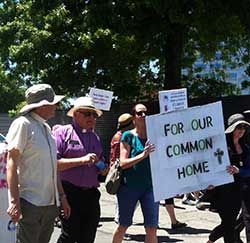
On Saturday I went to the climate action rally as part of those wanting to send a message to those in leadership and to the 2015 United Nations Climate Change Conference, being held in Paris from November 30 to December 11.
There was a reasonable turn out (estimate about 8,000). I saw five Anglican clergy in clerical collar, and a few other clergy there also, and a number of Anglican parishioners. The Quakers were very visible. As was the Green Party. It was good the Dean was one of the speakers. I was pleased to hear that the Bishop of Wellington spoke powerfully at their rally.

Elsewhere, Archbishop Winston Halapua of Polynesia stresses business as usual will destroy all of us. Our bishops have issued a statement. And “To strive to safeguard the integrity of creation, and sustain and renew the life of the earth” was the fifth mark of mission added to the other four by the Anglican Consultative Council in 1990.
So we have a wealth of church statements. In the speeches, the Anglican Church was also singled out as a leader in divesting from fossil fuel investments.
I still think much, much more can be done. I still think that the church, Christians, can give the impression, to ourselves and to others, that our nearly-total focus is on saving souls, on the next life – not this one, this planet.
It was good to walk with Bishop David – 25 years after he ordained me deacon; which was not long after I was his lay chaplain at his ordination to the episcopate in a crowd that could not fit in our Cathedral in the Square.
As a liturgical postscript: before we walked, some chants were rehearsed. The leader would say a statement and we, the crowd, responded. Those church communities who do not use responses do not really understand how vibrant human gatherings work. Those church communities who use responses, but read them all from books or OHPs, do not really understand how vibrant human gatherings work.
Chapel for prayer here.
Creation-focused resources here.
If you appreciated this post, consider liking the liturgy facebook page, using the RSS feed, and/or signing up for a not-very-often email, …



One of my most valued and oft read books id The Dream of the Earth by Thomas Berry. I have the original Sierra Club edition from 1988. I also have the sequel The Great Work. The Amazon webpage sums it up well; “Berry offers a new perspective that recasts our understanding of science, technology, politics, religion, ecology, and education. He shows us why it is important for us to respond to the Earth’s need for planetary renewal, and what we must do to break free of the “technological trance” that drives a misguided dream of progress. Only then, he suggests, can we foster mutually enhancing human-Earth relationships that can heal our traumatized global biosystem.”
PS – Who are the smiling chaps with you in the photo Padre?
Red stripes is an Old Boy of Christ’s College. He studied university theology while at school. On the right is the new Dean. Blessings.
I’m guessing Old Boy must be a title for an upper class-man? As he’s barely past puberty!
It is normal Kiwi usage, Br David, for a former student. Age has nothing to do with it. An eleven year old could be called an Old Boy of a primary school. Maybe you use the word “alumnus”? Such a word would sound pompous and pretentious in NZ – just like “Old Boy” appears to do for you. Isn’t it interesting how (the “same”) language can have such a different “feel”. There’s a lesson there… Blessings.
In North America, as per the US slang dictionary, an Old Boy is usually one who receives/partakes the privilege and advantage in the system of male nepotism in which ties formed at school or college are maintained in business, politics, etc.
So I sense that there is an affinity to the way you lot use the term.
LOL! And notice the pun on “ties”. This conversation is certainly taking the issue of climate change seriously…
Thanks, Br David. I will hunt that down. Maranatha
Part of the challenge of course is that posed for places like India, where colonial exploitation has rendered a perceived need for their continuing use of the coal and other natural resources that we, in the West, have long plundered for our own use. How do we address the need for Third World countries to join us in our ‘saving the planet’ ?
Great point, Fr Ron. I think we need to create technology that is less expensive than the cost of the plundering – an issue, of course, that then goes back to investment, and the power of the plunderers. Maranatha.